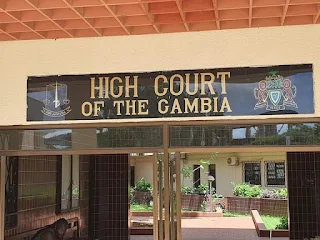Thursday, May 8, 2025
The Public Order Act Is Still Law
By Alagi Yorro Jallow
The Public Order Act: A Law of Controversy, But Still the Law. The Danger of Misinformation in Legal Discourse. The Case of Ousainou Darboe: A Legal Precedent.
Alagi Yorro Jallow
Few laws in The Gambia’s legal framework spark as much debate and contention as the Public Order Act. While critics argue that it is anti-democratic, the reality remains: it is a legitimate and enforceable law. Those who invoke constitutional principles must do so with accuracy and integrity, avoiding misinformation or political distortion.
The Public Order Act has been tested in court, challenged at the highest judicial levels, and remains legally binding. It is not a relic of dictatorship, nor is it an arbitrary tool of suppression—it is a law that has survived judicial scrutiny, including cases brought by prominent political figures.
The Case of Ousainou Darboe: A Legal Precedent
One of the most high-profile challenges to the Public Order Act came from Lawyer Ousainou Darboe, leader of the United Democratic Party (UDP). In 2016, Darboe and the UDP executive were arrested, tried, and convicted under this law for participating in unauthorized protests. Seeking justice, Darboe appealed his conviction at multiple levels:
• The Appeal Courts
• The Supreme Court
• The ECOWAS Court
Yet, each appeal was dismissed, reinforcing the legal validity of the Public Order Act. The courts upheld the government’s authority to regulate public demonstrations, confirming that while protest is a constitutional right, it must adhere to legal procedures.
This ruling sets a precedent—one that activists and legal commentators must acknowledge when discussing the law. In an era where social media amplifies narratives, it is imperative that discussions surrounding legal matters remain fact-based and intellectually honest. The Public Order Act is often misrepresented, with commentators twisting its provisions to fit political agendas. Conduct thorough legal research—understanding court rulings and precedents. Avoid political distortion—ensuring legal arguments remain objective. Uphold integrity in discussions—promoting fact-based activism rather than misleading rhetoric.
The Public Order Act remains a valid law, upheld by The Gambia’s highest courts. While its democratic implications can be debated, its legal standing is indisputable. Those who invoke constitutional principles must do so with accuracy, ensuring that public discourse remains informed, responsible, and free from manipulation.
Justice is not served through misinformation—it is upheld through fact-based legal challenges. If activists wish to contest the Public Order Act, they must do so through judicial processes, not through distorted narratives.The law is not perfect, but it is the law—and until it is successfully challenged, it remains binding.
Subscribe to:
Post Comments (Atom)



No comments:
Post a Comment